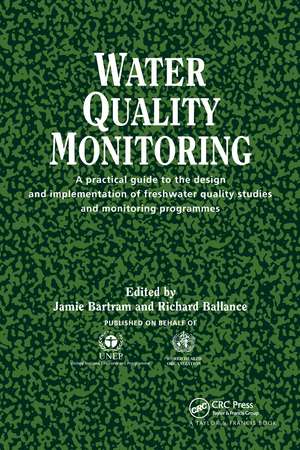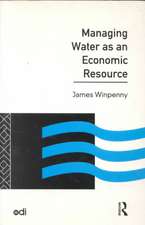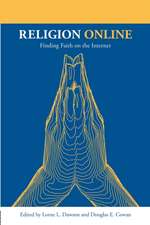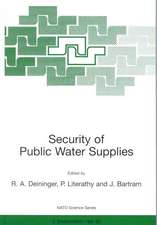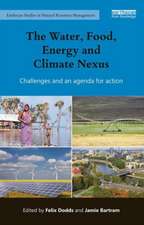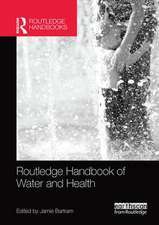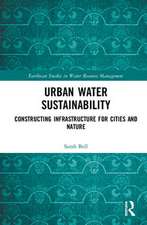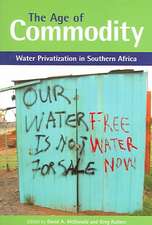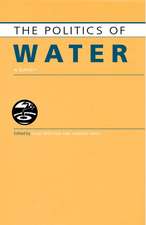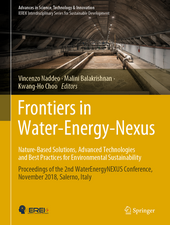Water Quality Monitoring: A practical guide to the design and implementation of freshwater quality studies and monitoring programmes
Editat de Jamie Bartram, Richard Ballanceen Limba Engleză Paperback – 25 iul 1996
This important text is the outcome of a collborative programme of activity between UNEP and WHO with inputs from WMO and UNESCO and draws on the international standards of the International Organization of Standardization.
| Toate formatele și edițiile | Preț | Express |
|---|---|---|
| Paperback (1) | 627.47 lei 6-8 săpt. | |
| CRC Press – 25 iul 1996 | 627.47 lei 6-8 săpt. | |
| Hardback (1) | 1410.55 lei 6-8 săpt. | |
| CRC Press – 25 iul 1996 | 1410.55 lei 6-8 săpt. |
Preț: 627.47 lei
Preț vechi: 840.44 lei
-25% Nou
Puncte Express: 941
Preț estimativ în valută:
120.10€ • 124.91$ • 100.64£
120.10€ • 124.91$ • 100.64£
Carte tipărită la comandă
Livrare economică 14-28 martie
Preluare comenzi: 021 569.72.76
Specificații
ISBN-13: 9780419217305
ISBN-10: 0419217304
Pagini: 396
Dimensiuni: 156 x 234 x 22 mm
Greutate: 0.59 kg
Ediția:1
Editura: CRC Press
Colecția CRC Press
ISBN-10: 0419217304
Pagini: 396
Dimensiuni: 156 x 234 x 22 mm
Greutate: 0.59 kg
Ediția:1
Editura: CRC Press
Colecția CRC Press
Recenzii
"This is essentially a practical book." - Environmental Engineering.
Cuprins
Foreword. Introduction. Water quality - introduction. Background. Surface water quality. Groundwater quality. Water use and water quality deterioration. References and further reading. Water quality monitoring. General considerations. Purpose of monitoring. Information requirements. Elements of water quality monitoring. Monitoring for management. References and further reading. Design of a monitoring programme. Objectives of a water quality monitoring programme. Description of the monitoring area. Selecting sampling stations. Selection of variables. Frequency and timing of sampling. Design examples on selection of sampling sites. References and further reading. Implementing a monitoring programme. Laboratory infrastructure. Transport. Staffing. Planning for implementation of a monitoring programme. Communication. Field work. Preparation of sample bottles. Preparation for a sample visit. Conducting field work. Sample preservation. Sample reception by laboratory. References and further reading. Sampling. Sampling procedures. Water samplers. Types of samples. Guidelines for sampling. Preparation, transportation and storage of samples. References and further reading. Field testing. General. Temperature. Transparency. pH. Conductivity (or specific conductance). Dissolved oxygen. Faecal coliforms. Quality control in the field. References and further reading. Physical and chemical analyses. General. Alkalinity. Aluminium. Biochemical Oxygen Demand, (BOD). Chemical Oxygen Demand, (COD). Boron. Calcium. Chloride. Chlorophyll-a. Flouride. Iron. Magnesium. Manganese. Nitrogen, ammonia. Nitrogen, kjeldahl. Nitrogen, nitrate. Phosphorus. Potassiuim. Selenium. Reactive silica. Sodium. Sulfate. Total dissolved solids. Total suspended solids. References and further reading. Advanced instrumental analysis. Atomic Absorption Spectrophotometry (AAS). Gas Chromatograpgy (GC). Flame photometry. Total, organic and inorganic carbon. Analytical quality control. Introduction and terminology. General principles. Quality assurance. Internal quality control (IQC). Inter-laboratory comparison. Summary. Bibliography, references and further reading. Microbiological analyses. General. Statistics and information. Information for decisions. Reporting. Graphical presentation of results. References and further reading. Annex 1: Field kits and their suppliers. Annex 2: List of reviewers. Index.
Notă biografică
Jamie Bartram (Edited by) , Richard Ballance (Edited by)
Descriere
Water quality monitoring is an essential tool in the management of water resources and this book comprehensively covers the entire monitoring operation.
This important text is the outcome of a collborative programme of activity between UNEP and WHO
This important text is the outcome of a collborative programme of activity between UNEP and WHO
